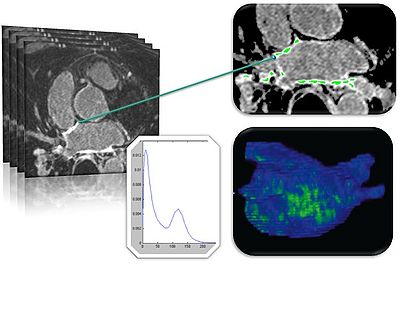DBP3:Utah draft
Back to NA-MIC DBPs | NA-MIC Cores
Contents
Welcome to the CARMA DBP: MRI-based study and treatment of Atrial Fibrillation
For an overview of the project and brief scientific and technical background, please review the following pages:
Executive Summary
Tissue remodeling of the atrial wall is the hallmark of Atrial Fibrillation (AF), a progressive cardiac disease that develops over time (months to years). The mechanisms of of this transformation are only partially understood, but the current scientific focus on tissue remodeling and its putative role in AF suggests an MRI image-based approach to the study of AF.
The Comprehensive Arrhythmia Research and MAnagement (CARMA) Center at the University of Utah is a world leader in the rapidly emerging field of MRI-managed evaluation and ablation of AF. Other groups have begun to recognize the potential of this approach and to investigate and validate some of our findings. Still others are developing new refinements of the MRI technique driven by the specific needs of this application domain.
Preliminary investigation by CARMA has identified image processing and analysis as the rate-limiting step to the development of MRI-based therapies. Novel forms of MRI can be used to evaluate new patients, predict success before ablation, analyze outcomes post-ablation, and guide repeat ablations. Such MRI-based therapies, however, urgently require advanced tools and software to support efficient workflows and accelerate the quantification and analysis of images. The CARMA-NAMIC DBP project will address some of these needs with the development of algorithms and tools for the automated segmentation of heart structures and the MRI-based evaluation of AF progression and recovery.
This remainder of this wiki page describes ongoing CARMA-NAMIC activities and accomplishments.
External Links
CARMA - NAMIC DBP project web page: http://www.na-mic.org/pages/DBP:Atrial_Fibrillation The CARMA Center at the University of Utah University of Utah Health Sciences The SCI Institute at the University of Utah
DBP Specific Aims
- Develop and validate image-based longitudinal diagnostic indices for AF
- Develop automatic segmentation methods for the atrium and adjacent structures
- Develop an AF scoring scheme to evaluate disease progression and recovery from therapy
(IMAGE ABOVE) The CARMA Center's Utah classification for Atrial Fibrillation staging involves segmentation of the left atrial wall from MRI, followed by quantification of enhanced vs. non-enhanced voxels in the wall.
Activites
- CARMA Slicer 4 Module Development
- Technical collaboration with GA Tech
- COMPLETED
- Test and Evaluate Behnood's wall segmentation: Results and analysis are here -> Automatic Wall Segmentation
- ONGOING
- Test and Evaluate Yi Gao's atlas-based endocardial segmentation algorithm -> Automatic Endocardial Segmentation
- Test and Evaluate Yi Gao's image and segmentation-driven registration algorithm -> Image and Segmentation-Driven Registration
- COMPLETED
- CARMA team learning/testing of Slicer tools
- ONGOING
- Image registration capabilities for longitudinal analysis Registration & Segmentation pipeline pilots & workflow development (Dominik Meier, Alex Zaitsev)
- Evaluation of BrainsFit and Fiducial-based registration tools for LA wall alignment and longitudinal registration of PV BrainsFit Registration of PVs
- ONGOING
- CARMA Public Longitudinal AFIB DE-MRI data
- COMPLETED
- Assemble dataset
- Obtain IRB for public release
- ONGOING
- Additional segmentations in preparation for release
- COMPLETED
- Slicer Module Development
- ONGOING
- Module: Yi Gao's multiatlas segmentation module
- Module: Rigid -> Affine (-> Deformable) general LGE-MRI registration: [2]
- Module: Cardiac MRI Registration -> AFib Registration Cases
- ONGOING
Engineering Wishlist
- Some extend support for DICOM I/O (ITK V.4 may take care of this)
- Tools for deformable image registration (example applications exist in both clinical image management and in experiments) .)
- Tools for image registration, in general, is a big need that we have. Again, examples exist for both clinical and experimental data.
- GUI support for "steerable" segmentation methods like level-set methods, active contours, etc. (e.g. GA Tech's work on left atrium segmentation).
- Workflow
- Interaction widgets
- Placing fudicials, guides, constraints, walls, sources, sinks, etc.
- "Show me a histogram, let me pick a range from the histogram" and provide means for histogram processing to suggest thresholds.
Sample Data
- Two Subjects Two Time Points: Data is File:CardiacMRIs.zip
